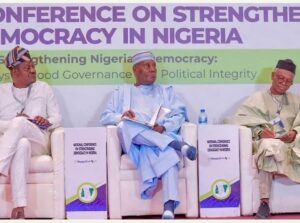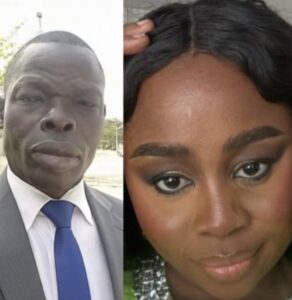The Political Dynamics Ahead of 2027: Unlikely Alliances and the Dismal Fate of the Masses
The Political Dynamics Ahead of 2027: Unlikely Alliances and the Dismal Fate of the Masses

As we move through 2025, it’s hard to ignore the mounting political tension surrounding the 2027 election. Despite still being years away, the political climate is already heated, with strategies, alliances, and public statements hinting at what’s to come. The level of discourse and maneuvering almost makes one feel the election is just around the corner.
Among the most fascinating shifts in Nigerian politics is the unexpected collaboration between former Vice President Atiku Abubakar and ex-Governor Nasir El-Rufai. What makes this pairing particularly intriguing is the bitter history between the two men, and how, despite their past hostilities, they are now finding common ground against their shared enemy, President Bola Tinubu.
El-Rufai, whose contribution to Tinubu’s rise to power cannot be overstated, now feels deeply betrayed by his exclusion from the new administration. Yet, in response to this, he’s chosen to ally with Atiku, the same man he previously turned against with ruthless determination. This shift is akin to a soldier who, after securing the throne for a king, is cast out and now seeks refuge in the arms of a former comrade he once betrayed, hoping that their mutual disdain for the new ruler will be enough to heal old wounds.
El-Rufai’s political journey is no stranger to betrayal. He has openly dismissed any gratitude towards Atiku, despite the latter’s pivotal role in El-Rufai’s own political ascent. In fact, El-Rufai was instrumental in thwarting Atiku’s presidential aspirations, working as a key player in President Olusegun Obasanjo’s campaign to prevent Atiku from running for office. His actions, particularly the famous meetings with foreign diplomats urging Atiku’s disqualification, were part of a broader strategy to destroy his former ally’s chances.
As much as betrayal is commonplace in politics—especially in the murky waters of Third World politics—it still raises the question of what Atiku must think when strategizing with someone like El-Rufai. Does he see him as a genuinely remorseful figure looking for redemption, or as someone whose loyalty is driven purely by political survival? For Atiku, working with El-Rufai likely feels like eating with someone who once poisoned his food. Trust is scarce, and every gesture and word is weighed carefully, knowing that today’s ally can easily become tomorrow’s foe.
Yet, in the cynical world of politics, it’s not always about trust. Sometimes, alliances are forged out of sheer necessity—formed not out of friendship, but to counter a common enemy. This pragmatic approach is reflected in rumors of a potential political alignment between Tinubu and former Governor Rabiu Musa Kwankwaso. Though the two seem at odds, recent appointments, such as Ganduje’s elevation to head the Federal Airport Authority, suggest that they may be inching toward a working relationship. A Tinubu-Kwankwaso alliance could pose a serious challenge to the Atiku-El-Rufai coalition.
Amid all these shifting allegiances, what’s truly missing is a serious conversation about the state of the Nigerian people, especially those struggling with poverty. The relentless rise of market forces and neoliberal economic policies has created a growing chasm between the elites and the poor. Politicians seem far removed from the daily struggles of ordinary Nigerians, preoccupied with power struggles while the people bear the brunt of an economy that leaves them more vulnerable than ever.
It’s disheartening to see that neither the ruling party nor the opposition has presented a compelling vision for an economy that prioritizes the welfare of the people. The current discourse around “economic growth” is eerily detached from the realities of ordinary citizens who are grappling with an ever-worsening economic landscape. While Argentina’s populist president is hailed for growing the economy, the people are left in extreme poverty, with no tangible improvement in their quality of life. Similarly, Tinubu’s reforms are praised in international circles, yet they seem to be worsening the plight of the masses.
None of the politicians vying for power in 2027 seem to be addressing the real issue: the systemic poverty and inequality that plague the country. Instead, they focus on abstract economic growth, ignoring the very real suffering of ordinary people. Sadly, the masses have grown accustomed to a life of disappointment and hardship, and the promises of change have become little more than empty rhetoric.
Perhaps the most disturbing aspect is that the people have become numb to these promises. After years of disappointment, cynicism has taken hold, and survival has replaced hope as the central focus. In such a climate, politics has become a mere spectacle, with citizens resigned to the fact that their situation will not improve, no matter who is in power.
As Bertrand Russell once observed, many people are caught in a cycle of political disillusionment, believing that a change in party will bring salvation, only to be disappointed once again. This cycle continues as politicians focus on securing power rather than addressing the real needs of the people, and the people, in turn, continue to watch passively, expecting nothing and receiving nothing in return.
TRENDING SONGS
 RCCG PASTOR ANGRY OVER CALLING Him“MR” INSTEAD OF “DR,” DECLARES CURSE ONLINE
RCCG PASTOR ANGRY OVER CALLING Him“MR” INSTEAD OF “DR,” DECLARES CURSE ONLINE
 NPMA Appeals to Nigerian Government for Compensation After Lagos Market Fire
NPMA Appeals to Nigerian Government for Compensation After Lagos Market Fire
 Rest Every Four Hours, FRSC Issues Safety Guide for Fasting Motorists
Rest Every Four Hours, FRSC Issues Safety Guide for Fasting Motorists
 NNPC Boss Ojulari Bags UK Energy Institute Fellowship
NNPC Boss Ojulari Bags UK Energy Institute Fellowship
 Shock in Anambra: Bride Disappears Moments Before Wedding
Shock in Anambra: Bride Disappears Moments Before Wedding
 Nigerian Woman Returns ₦330 Million Accidentally Credited to Her Account
Nigerian Woman Returns ₦330 Million Accidentally Credited to Her Account
 APC Don Reach Morocco?’ VeryDarkMan Reacts to Seyi Tinubu Poster
APC Don Reach Morocco?’ VeryDarkMan Reacts to Seyi Tinubu Poster
 Bride Breaks Down in Tears as Wedding Meals Were Kept Secretly While Guests Go Home Hungry
Bride Breaks Down in Tears as Wedding Meals Were Kept Secretly While Guests Go Home Hungry
 Odogwu by Day, Robber by Night: How Marriage Joy Turned Into Tragedy
Odogwu by Day, Robber by Night: How Marriage Joy Turned Into Tragedy
 Nigerian Officials Allegedly Pocket N4–6B Weekly Through Smuggling Cartels at Seme–Badagry Border
Nigerian Officials Allegedly Pocket N4–6B Weekly Through Smuggling Cartels at Seme–Badagry Border
Share this post with your friends on ![]()













